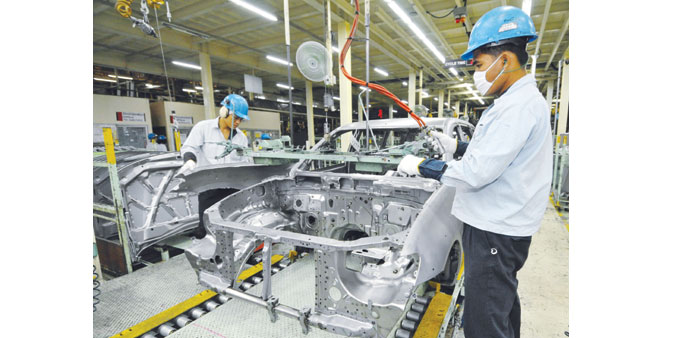Workers assembling a car at a Mitsubishi Motors plant in Laem Chabang, Thailand. Some pillars of the Thai economy remain shaky, but the country likely avoided a recession in April-June after the army took power in a bid to end political tensions and get state and private spending going again.
Reuters
Some pillars of the Thai economy remain shaky, but the country likely avoided a recession in April-June after the army took power in a bid to end political tensions and get state and private spending going again.
The planning agency will announce second quarter gross domestic product figures on Monday. In the first quarter, the economy shrank 2.1% from the previous three months.
Earlier this year, many economists thought there would be contraction in April-June too.
But the median forecast in a Reuters poll is for on-quarter, seasonally adjusted growth of 0.9%, which would mean Thailand avoided a technical recession – defined as two consecutive quarterly contractions.
On an annual basis, the economy probably grew 0.3% after contracting 0.6% in January-March, the poll showed.
The Bank of Thailand (BoT) has forecast on-quarter growth of more than 1% and on-year contraction of 0.4%.
Skirting recession does not mean solid growth has returned.
Gundy Cahyadi, an economist with DBS Bank in Singapore, said the economy might have avoided a technical recession “but the outlook is still far from being robust.”
“GDP growth momentum is likely to pick up in late 2014 but a return to near-term potential will still take some time, even if the government is going to be clearly pro-growth,” he added.
The junta, which took power on May 22, has made delayed payments to rice farmers, approved infrastructure projects and accelerated approvals for private investment applications halted by political unrest.
The moves have helped improve sentiment. A university’s index of consumer confidence, which fell for 13 straights months through April, has risen since the coup. But consumption remains subdued and auto sales are tumbling. And the key tourist industry, which accounts for about 10% of GDP, has not fully recovered. In April-June, the number of visitors were 12.3% fewer than 2013, while hotel occupancy rates were about 48% in the quarter. The junta has lifted curfews but kept martial law, which can pose issues in some insurance policies for travel.
Five-star hotelier Erawan group, which earlier forecast a 2%-4% rise in revenue this year, said on Thursday it expects a 9% fall. “Although revenue will improve in the second half, it can’t offset a weak first half,” chief financial officer Kanyarat Krisnathevin said.
Hemaraj Land and Development said on Thursday it cut its 2014 industrial land sales target by 25%, to 192 hectares, due to the weak economy.
Exports account for more than 60% of the economy, so sustained growth gains depend on raising shipments. But these have been held by not by politics – the crisis did not disrupt ports or factories - but by weak global demand.
Weak exports have in turn hit factory output. In April-June, exports rose just 0.6% from a year earlier, central bank data showed.
In the Reuters poll, just one of 11 respondents – economist Barnabas Gan of OCBC Bank in Singapore – forecast GDP to have a second consecutive shrinkage in April-June, citing lacklustre investment and consumption during the period.
Gan agrees with others that the Thai economy will see “better times in the second half”, helped by improved consumer confidence and government spending on infrastructure.

